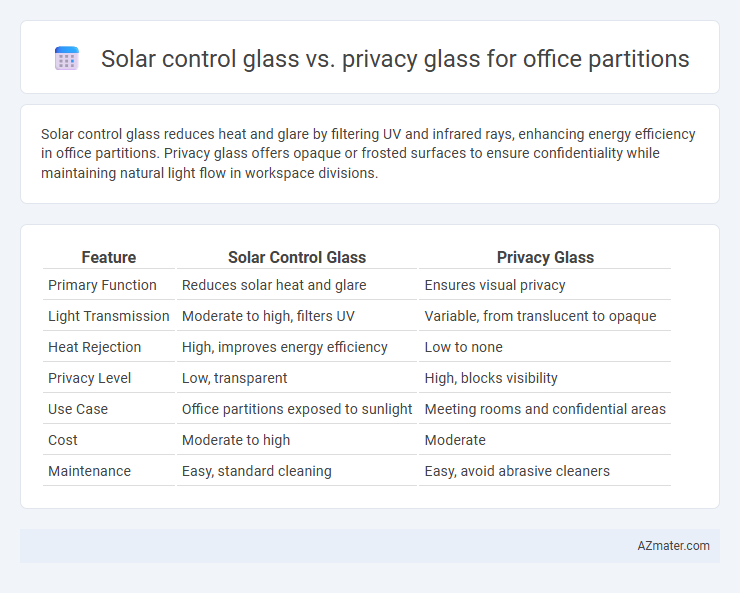Solar control glass reduces heat and glare by filtering UV and infrared rays, enhancing energy efficiency in office partitions. Privacy glass offers opaque or frosted surfaces to ensure confidentiality while maintaining natural light flow in workspace divisions.
Table of Comparison
| Feature | Solar Control Glass | Privacy Glass |
|---|---|---|
| Primary Function | Reduces solar heat and glare | Ensures visual privacy |
| Light Transmission | Moderate to high, filters UV | Variable, from translucent to opaque |
| Heat Rejection | High, improves energy efficiency | Low to none |
| Privacy Level | Low, transparent | High, blocks visibility |
| Use Case | Office partitions exposed to sunlight | Meeting rooms and confidential areas |
| Cost | Moderate to high | Moderate |
| Maintenance | Easy, standard cleaning | Easy, avoid abrasive cleaners |
Introduction: Comparing Solar Control Glass and Privacy Glass
Solar control glass enhances office energy efficiency by reducing heat gain and blocking UV rays while maintaining transparency. Privacy glass offers visual obstruction through frosted or tinted finishes to ensure confidentiality in office partitions. Both glass types improve workplace comfort but address different needs: solar control glass targets temperature regulation and glare reduction, whereas privacy glass focuses on visual separation.
Functionality Overview of Solar Control Glass
Solar control glass for office partitions reduces heat gain by filtering out infrared radiation, enhancing energy efficiency and occupant comfort. It maintains natural daylight while minimizing glare, contributing to a productive workspace environment. Unlike privacy glass, which restricts visibility for confidentiality, solar control glass primarily focuses on thermal management and light regulation without compromising transparency.
Key Features of Privacy Glass
Privacy glass for office partitions offers dynamic opacity control, enhancing confidentiality by switching between transparent and frosted states with an electrical signal. It blocks harmful UV rays and reduces glare, contributing to a comfortable and productive workspace. Unlike solar control glass, privacy glass prioritizes visual privacy and design flexibility, making it ideal for meeting rooms and confidential areas.
Energy Efficiency Benefits in Office Spaces
Solar control glass significantly reduces heat gain by reflecting infrared radiation, lowering cooling costs and enhancing energy efficiency in office partitions. Privacy glass, while offering visual obstruction, typically lacks advanced thermal insulation properties and may contribute less to overall energy savings. Choosing solar control glass optimizes natural light management and temperature regulation, creating a more sustainable office environment.
Daylight Management and Glare Reduction
Solar control glass for office partitions effectively manages daylight by filtering harmful UV rays and reducing solar heat gain without compromising natural light, enhancing energy efficiency. Privacy glass, often frosted or patterned, prioritizes visual obstruction to ensure confidentiality while diffusing incoming daylight, thereby minimizing glare and providing a comfortable work environment. Both glass types contribute to glare reduction, but solar control glass excels in daylight management by maintaining brightness and thermal comfort simultaneously.
Privacy and Security Considerations
Privacy glass for office partitions significantly enhances confidentiality by obscuring visibility and preventing unauthorized observation, which is crucial in sensitive work environments. Solar control glass primarily reduces glare and heat transmission but offers minimal privacy protection, making it less effective for secure partitioning. Selecting privacy glass ensures a higher level of security by maintaining discrete meeting areas and safeguarding proprietary information from visual exposure.
Design Flexibility and Aesthetics
Solar control glass for office partitions enhances design flexibility by allowing customizable tint levels that reduce glare and heat without compromising natural light, creating visually comfortable spaces. Privacy glass offers aesthetic versatility with options like frosted, patterned, or switchable smart glass, providing tailored solutions for confidentiality while maintaining modern office appeal. Both materials support sleek, contemporary designs, but solar control glass emphasizes environmental comfort, whereas privacy glass focuses on visual seclusion and decorative possibilities.
Cost Analysis and Budget Considerations
Solar control glass for office partitions typically incurs higher initial costs due to advanced coatings that reduce heat gain and glare, resulting in long-term energy savings and lower cooling expenses. Privacy glass, often achieved through frosted or switchable film applications, generally involves lower upfront investment but may not contribute to energy efficiency, potentially increasing operational costs. Budget considerations should weigh the balance between immediate installation expenses and future energy savings, with solar control glass favored in environments prioritizing sustainability and reduced HVAC load.
Installation and Maintenance Factors
Solar control glass for office partitions requires precise installation to ensure optimal alignment with external shading and HVAC systems, preventing glare and reducing energy costs, while its maintenance mainly involves regular cleaning to maintain transparency and efficiency. Privacy glass installation demands careful sealing and electrical wiring if switchable privacy features are included, necessitating specialized skills, with maintenance focused on preserving the opacity function and preventing surface damage. Choosing between these options depends on balancing ease of installation and ongoing maintenance needs against desired functionality and office environment control.
Choosing the Right Glass for Your Office Partition
Solar control glass for office partitions minimizes heat gain and glare from sunlight, enhancing energy efficiency and occupant comfort by reducing reliance on air conditioning. Privacy glass offers variable opacity to maintain confidentiality and reduce visual distractions while allowing natural light to permeate the workspace. Selecting the right glass depends on balancing energy performance, privacy needs, and aesthetic preferences to create a functional and comfortable office environment.

Infographic: Solar control glass vs Privacy glass for Office partition
 azmater.com
azmater.com